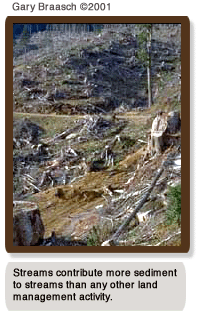National Policy & U.S. Forest Service Roads
The most significant threat to aquatic ecosystems
on federal public lands comes from roads. Of the over
400,000 miles of roads that crisscross United States Forest
Service (USFS), more than 50 percent fail to meet
current public safety and environmental standards,
resulting in severe and sometimes irreversible
degradation of aquatic habitats. The areas that have
been spared from road building contain some of the last
and most intact aquatic ecosystems in the nation. Yet,
until recently, there was no national policy to
adequately protect these unroaded areas or address the
ecological effects of the USFS extensive road system.

PRC has worked for the last three years to change
this. Working directly with the USFS, independent
scientists, conservation organizations, and the public,
PRC has advocated for meaningful reform of USFS policy.
In January of this year, we and our conservation
colleagues secured a major victory with the final
adoption by the USFS of two seminal regulations that
promise to address and hopefully reverse the harm caused
by decades of inappropriate road construction and
inadequate road maintenance practices.
The first regulation, called the roadless area
conservation rule, severely limits new road
construction and logging in nearly 60 million acres of
currently roadless forestlands. This regulation applies
to areas that are either inventoried roadless areas or
contiguous unroaded areas of 1000 acres or more. With
unprecedented public support, the USFS approved this
rule in the waning days of the Clinton Administration.
Unfortunately, despite its popularity, the rule is under
attack in both the courts and in the new Bush
Administration. In response, PRC is taking steps to
staunchly defend this important policy from evisceration
and will continue to advocate for adequate
implementation and funding of the policy in the months
to come.
The second regulation, called the forest
transportation system rule, has received much less
public attention but could become no less significant in
scope or effect. This rule modifies existing regulations
governing the management of the forest transportation
system on all USFS forest and grassland units in the
country. The new rule requires, for the first time, that
the transportation system be managed in a fiscally
responsible manner within the environmental capabilities
of the land. This policy is a marked departure from the
timber access dominated policies of the past and carries
substantive weight.
In the coming months, PRC will lead efforts to
advocate for the implementation of the new policy. We
have already conducted an extensive
scientific and policy assessment of the rule and we
will be issuing a revised roads management briefing book
for use by citizens, conservation organizations, and
agency staff. In addition, we will be providing
technical assistance to selected individual forests to
ensure that the first road analysis and plan amendments
completed under the new policy establish a standard for
scientific rigor, accuracy, and completeness. We will
also be looking for opportunities to maximize the
potential of the two new polices to protect and restore
degraded habitats in specific critical aquatic diversity
areas identified by PRC. No other Forest Service
activity has as great an effect on watershed integrity
as does roads management. PRC will continue to play a
lead role in ensuring that implementation of the new
policies for the three specific issues at stakeroadless
area protection, construction of new roads, and
management of existing roadsbe based on ecological, not
transportation, priorities.
|


